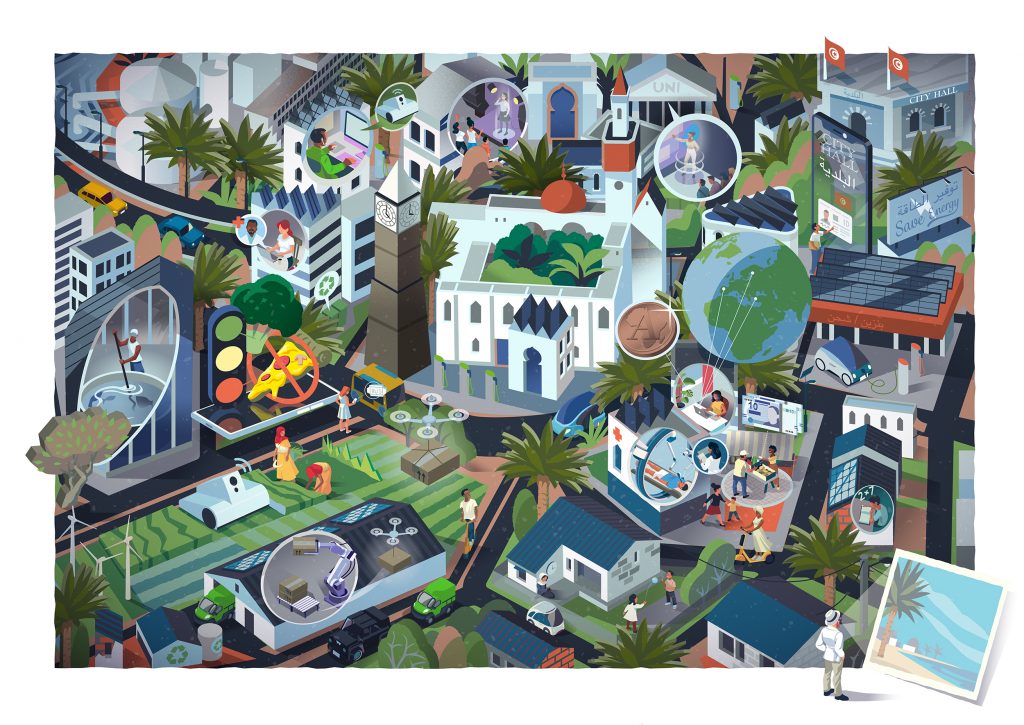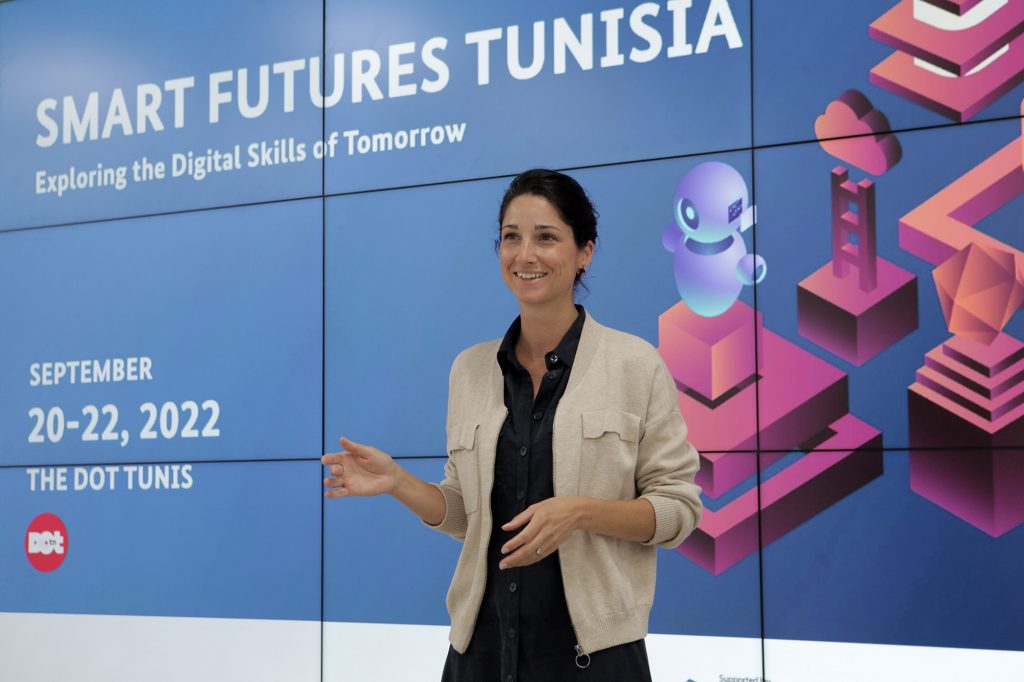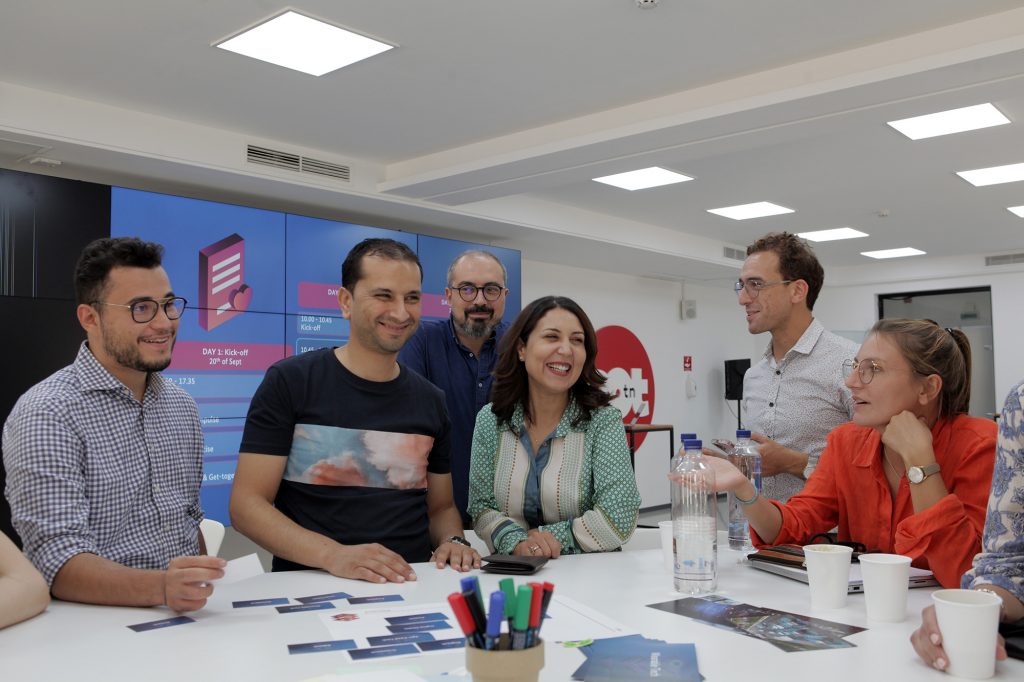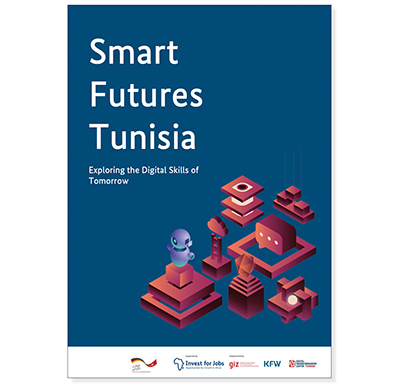

Smart Futures Tunisia - GIZ
Foresight journey for Tunisia and its digital economy
Studio Nima embarked on a foresight journey with Deutsche Gesellschaft für Internationale Zusammenarbeit (GIZ) funded by the Special Initiative on Training and Job Creation commissioned by the Federal Ministry of Economic Cooperation and Development (BMZ). Together with multiple stakeholders that are shaping the future of Tunisia, we jointly developed a visual future scenario and discussed how to create a visionary basis for recommendations on how the Tunisian population can develop the skills that will be needed in 2035.
What could and should Tunisia look like in 2035?
How will digitalisation shape Tunisia’s future by then?
What will be the jobs of the future and what needs to be done today to ensure that the Tunisian society can acquire the necessary skills?

Illustration by Björn Öberg – https://bjornoberg.com
To find answers to these questions, we designed and executed a foresight journey on behalf of Deutsche Gesellschaft für Internationale Zusammenarbeit (GIZ) with multiple experts and stakeholders from start-ups, NGOs, companies and public representatives. Over the course of several months, we developed and discussed desirable future scenarios to envision future jobs and to derive recommendations on how the Tunisian population can develop the skills that will be necessary in the digital economy of 2035.
Why foresight?
Foresight is a tool used by companies, organizations and governments for creative visioning and strategic roadmapping. Foresight allows an interactive, visionary, but still systematic approach to future scenario development. As such, foresight is not about trying to predict the future, but rather to proactively shape it and help overcome its complexity.
Our approach
To verify important hypotheses and understand the trends shaping the digital economy of Tunisia, we conducted several interviews with experts and stakeholders early on in the process. Together we pre-defined and prioritized key topics and trends that will be impactful in 2035. This served as an important base for the 2.5-day on-site workshop in Tunis as a core component of Smart Futures Tunisia. Start-ups, NGOs, companies and public representatives worked together on developing a joint vision of a desirable future of Tunisia focusing on questions related to labor markets and skills that will be crucial in the future.

We explored what different areas of living in the future will look like based on building blocks including food, mobility, living, nature as well as thematic areas including fintech, digital health, agtech, and many more. Building on these ideas, an overall scenario was built for 2035 answering among others the questions:
How will people in Tunisia work, travel, learn, shop?
How will mobility systems look like?
How will digitalisation affect industries, governmental services or health services?
What kind of energy will be used and how will it be produced?

We then took a step back and discussed what future jobs might exist and what skills will be necessary to reach the envisioned future in 2035. We went back from the future into the present and derived initial recommendations. What do we need to do NOW to get to the envisioned future?
Following the foresight exercise in Tunis, we conducted several expert feedback loops and refined the future scenarios, future job skills and recommendations.
The final report of Smart Futures Tunisia takes us to the year of 2035 and shows the way in which we might work, travel, learn and live. It summarizes the results of the foresight journey, including the visual illustration of the future scenario, an accompanying narrative, recommendations derived and a futuristic vision on jobs and skills in the digital economy.
However, this is not the end of the foresight journey. The future is constantly being shaped and thus the future scenario built has to be with time re-visited and re-evaluated. The report also includes recommendations on how the foresight journey could – and should – be continued. We invite you to take part in shaping the future and we look forward to seeing how this dynamic journey will be continued.
About Smart Futures Tunisia
Smart Futures Tunisia is funded by the Federal Ministry of Economic Cooperation and Development (BMZ), and commissioned to the Deutsche Gesellschaft für Internationale Zusammenarbeit (GIZ), as part of the Special Initiative on Training and Job Creation – “Invest for Jobs” through the GIZ flagship program the Digital Transformation Center Tunisia.
Under the Invest for Jobs brand, the German Federal Ministry for Economic Cooperation and Development (BMZ) has put together a package of measures to support German, European and African companies engaging in Africa. The Special Initiative on Training and Job Creation –the official title –offers comprehensive advice, contacts and financial support through its implementing organisations to overcome investment barriers. The development objective is to team up with companies to create up to 100,000 jobs, generate training opportunities and improve working conditions in the African partner countries. Programmes are currently in place in the Special Initiative’s eight partner countries: Côte d’Ivoire, Egypt, Ethiopia, Ghana, Morocco, Rwanda, Senegal and Tunisia.
